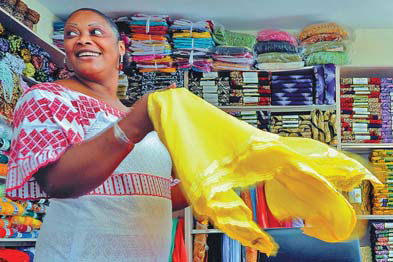Managing trade like running the UN
Updated: 2013-03-29 07:10
By Xu Junqian in Shanghai (China Daily)
|
||||||||
|
A Senegalese businesswoman shows her company's products in Yiwu, Zhejiang province, in July. Tan Jin / Xinhua |
As deputy director of a small sector of the Yiwu International Trade Center in Zhejiang province, Zhu Xingping thinks he is doing as decisive a job as the secretary-general of the United Nations.
Of course, the man in charge of introducing imported African commodities to thousands of middlemen in Yiwu and bringing these exotic, colorful wood carvings and painted masks to the whole nation is not drawing a serious analogy, but his comparison is well justified.
As Sino-African trade has spiked in the past few years - surpassing $200 billion in 2012, according to Standard Bank, the largest bank on the African continent - Yiwu, a small, once-impoverished agricultural town, has become a powerhouse and supermarket for the country, if not the world.
"Going out is 'out', and it's time for 'bringing in'," said Zhu, who oversees 50 stalls in a corner of the 4.3-million-sq-m center, the world's largest shopping complex that houses 70,000 stalls. The 50 stalls, 38 of which are leased out, are designed for wholesale souvenirs as well as art and crafts from the African continent.
In the past decades, shrewd and hardworking businessmen in Yiwu, a rural backwater that has few geographical or natural advantages in East China, have made their fortunes selling various kinds of zippers, socks and plastic jewelry that were handmade in their living rooms and sent all over the world. The strategy has been copied by their countrymen trying to emerge from poverty, and was called "going out".
However, as the economic recession is affecting the globe - especially Europe and the United States, two of the main destinations of exports from Yiwu - and the cost of labor and raw materials keeps rising domestically, sharp-minded businessmen in Yiwu had their eyes on Africa, a new land bringing hope and possibly wealth.
But instead of simply shipping containers of small commodities to Africa and squeezing a small profit, they chose to "double their channels of money-making" by starting two-way trade.
"The largest market is the market at home," said Zhu.
Standard Bank reported that imports from Africa to China increased 26 percent in 2012. While that number is insignificant compared with the amount of China's exports to Africa, which accounts for almost one-fifth of the continent's total imports, businesspeople in Yiwu are showing great confidence of "a more promising figure".
Luo Lingjuan, president of the Africa Yiwu Chamber of Commerce and Industry, is taking the lead.
The businesswoman, who has been in the perfume business for nine years in South Africa, has been spending more time at home since 2011 opening up her new business. With her connections in both Africa and Yiwu, Luo has started reselling specialties from South Africa, like wine and gemstones, in her hometown.
"It not only can supplement the low profit from exports, but also make up for the uncertainty of yuan appreciation during trading," she said.
African traders in Yiwu are also quickly following the path, if not becoming leaders as well.
Mamadou Sall, president of African Businessmen in Yiwu, said that his company is focusing more on importing African agricultural products to China.
xujunqian@chinadaily.com.cn
(China Daily 03/29/2013 page3)

 In Photos: 7.0-magnitude quake hits Sichuan
In Photos: 7.0-magnitude quake hits Sichuan
 Li Na on Time cover, makes influential 100 list
Li Na on Time cover, makes influential 100 list
 FBI releases photos of 2 Boston bombings suspects
FBI releases photos of 2 Boston bombings suspects
 World's wackiest hairstyles
World's wackiest hairstyles
 Sandstorms strike Northwest China
Sandstorms strike Northwest China
 Never-seen photos of Madonna on display
Never-seen photos of Madonna on display
 H7N9 outbreak linked to waterfowl migration
H7N9 outbreak linked to waterfowl migration
 Dozens feared dead in Texas plant blast
Dozens feared dead in Texas plant blast
Most Viewed
Editor's Picks

|

|

|

|

|

|
Today's Top News
Live report: 7.0-magnitude quake hits Sichuan, heavy casualties feared
Boston suspect cornered on boat
Cross-talk artist helps to spread the word
'Green' awareness levels drop in Beijing
Palace Museum spruces up
First couple on Time's list of most influential
H7N9 flu transmission studied
Trading channels 'need to broaden'
US Weekly

|

|








